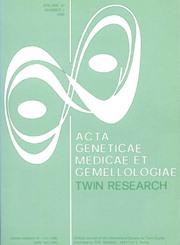Article contents
Multiple Pregnancy: Factors Contributing to Early Infant's Breast-feeding – Own Experience
Published online by Cambridge University Press: 01 August 2014
Abstract
The aims of the study were as follows: 1. to evaluate the effectiveness of current program to promote breast-feeding in our population of infants from multiple pregnancy; 2. to define factors responsible for failure in early breast-feeding establishing and /or maintaining breastfeed during the hospitalization of the babies in neonatal department. 122 newborn infants (2 sets of triplets and 58 twin pairs) born in the Clinic for Pathology of Pregnancy and Labor in Szczecin, Poland, in the years 1995 (January) – 1999 (May) from multiple pregnancy were included in the study. In the examined material there were estimated neonatal conditions at birth, neonatal complications, which may disturb successful breast-feeding as well as other factors contributing to early breast-feeding, the way of feeding the babies during neonatal period and the mean time of starting breast-feeding. It was found that most of the examined babies were born with the features of prematurity: mean gestational age was 35,6 ± 2,2 weeks and mean birthweight – 2225,3 ± 193,2 grams. Only 57,4% of babies were born in good conditions according to Apgar scores. Factors which influence in a negative way early breast-feeding were as follows: respiratory disturbance (22,1%), temporary oral nutrition intolerance due to sickness of the baby or early onset of infections (27,5%), operative delivery (62,3%), medicine taken by mothers (13,9%) and failure in maternal lactation (8,2%). Factors disturbing a normal course of breast-feeding were: fototherapy due to hyperbilirubinemia (20,5%) and late onset of infections (1,6%). In most cases breast-feeding was started 3-4 days after birth and the most frequent way of feeding was formula followed or in combination with maternal milk (at discharge in 86,9% of babies).
We concluded that exclusive breast-feeding, despite program of promotion, is a rarity in population of newborn babies born from multiple pregnancy; time to start breast-feeding in this population is usually 3-4 days after delivery. Most pre-term and full-term twins are discharged from neonatal department on maternal milk – exclusively or in combination with formula in situation of scarce maternal milk for two or more infants – what should be considered as our professional success.
- Type
- Research Article
- Information
- Acta geneticae medicae et gemellologiae: twin research , Volume 47 , Issue 3-4 , October 1998 , pp. 191 - 196
- Copyright
- Copyright © The International Society for Twin Studies 1998
References
REFERENCES
- 8
- Cited by


